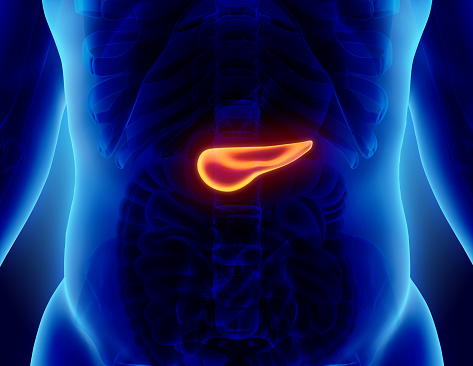
Rates of mortality due to pancreatic cancer were not predicted to improve across Europe in 2021, and may even increase among women, according to a new study published in the Annals of Oncology.
The research team calculated predictions based on the rates of cancer mortality in 27 countries within Europe since 1970, focusing on the six most populous countries: France, Germany, Italy, Poland, Spain, and the United Kingdom (U.K.). Overall and individual cancer rates were assessed, including stomach, intestinal, pancreatic, lung, breast, gynecological, genitourinary, and hematological cancers.
Using a joinpoint regression model, the investigators predicted the number of cancer-related deaths and age-standardized cancer mortality rates for 2021.
Rates of mortality due to pancreatic cancer showed no significant decline across Europe since 1970, regardless of sex. The rate of pancreatic cancer occurrence overall fell by 10% and 3.4% among European men and women aged under 50 years.
The predictive model estimated that eight and 6.5 men per 100,000 in Europe and the U.K., respectively, will die due to pancreatic cancer in 2021, representing a 0.8% decline since 2015. For women, on the other hand, pancreatic cancer-related mortality was predicted to increase by 0.6% since 2015. The model predicted six and five deaths due to pancreatic cancer per 100,000 women in Europe and the U.K., respectively.
“Among the major cancers, pancreatic cancer is the fourth most common and remains the only one showing no overall fall in death rates over the past three decades in Europe in both sexes,” said lead author Carlo La Vecchia, MD, professor at the University of Milan in Italy, via a press release.
Using this data, the research team have called on European health care policymakers to invest in resources to improve diagnosis and treatment of pancreatic cancer to improve these numbers.
“It is important that governments and policymakers provide adequate resources for the prevention, early diagnosis and management of pancreatic cancer in order to improve these trends in the near future,” Dr. Vecchia said.
“Delayed cancer diagnosis and treatment due to the COVID-19 pandemic may increase the cancer burden over the next several years,” said co-author Paolo Boffetta, MD, professor at Stony Brook University in New York. “The results we report this year are particularly important because they stress the fact that trends in mortality from pancreatic cancer … do not show the positive pattern of other major cancers, underlying the need for further efforts for research and control of these neoplasms.”
Europe needs to tackle pancreatic cancer deaths, data shows https://t.co/H7vSUGSoID
— The Irish Times (@IrishTimes) February 22, 2021
Researchers are calling on European policymakers to invest adequate resources to tackle pancreatic cancer in Europe.#Cancer #Health #Funding https://t.co/tfJFgRib4c
— Health Europa (@HealthEuropa) February 22, 2021







 © 2025 Mashup Media, LLC, a Formedics Property. All Rights Reserved.
© 2025 Mashup Media, LLC, a Formedics Property. All Rights Reserved.